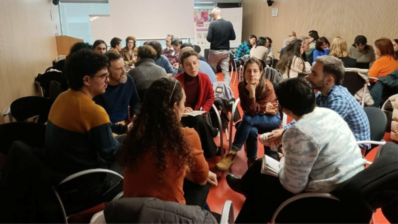In recent months, several researchers at the Barcelona Biomedical Research Park (PRBB) centres have received several prizes and grants, both from the EU and the US, which recognize their scientific careers and contributions, and fund new exciting projects.
IBE: Recognition for Paleogenetics
The researcher from the Institute for Evolutionary Biology (IBE: CSIC-UPF) and current director of the Museum of Natural Sciences of Barcelona (MCNB), Carles Lalueza-Fox, has won the international anthropology award “Fabio Frassetto”. It was presented to him on November 10th at the Palazzo Corsini, the headquarters of the National Academy of Lincei in Rome, by the President of the Italian Republic, Sergio Mattarella.
This international award, with a prize of 25,000€, recognizes a research career in the field of physical anthropology. It acknowledges Lalueza-Fox as one of the leading researchers in paleogenetics in Europe.
Lalueza-Fox’s research encompasses the analysis of extinct species and human populations throughout history. His study on the genomes of ancient human populations led to the book “Inequality: A Genetic History”, as well as other popular science publications that have earned him several awards in scientific communication.
MELIS-UPF: Implementing temporary programs in living cells to perform autonomous tasks
Javier Santos Moreno, a postdoctoral researcher linked to the Translational Synthetic Biology Research Group (SYNBIO) of the Department of Medicine and Life Sciences (MELIS-UPF), has received a European Research Council (ERC) Starting Grant. These grants, endowed with between 1.5 and 2.5 million euros during 5 years, are part of the European Union’s Horizon Europe programme.
Santos will be leading the project “Engineering biological timers and their applications” (TICK-TOCK Do and Die), which seeks to develop the tools that allow us to implement temporary programs in living cells so that they carry out tasks autonomously, without human supervision. “In the future, cells equipped with these tools could allow us to eliminate a toxic spill or stimulate the growth of a crop for a certain time, and then self-destruct to avoid altering ecosystems”, asserts the scientist.
ISGlobal: Forecasting the health effects of air pollution
The Barcelona Institute for Global Health (ISGlobal)‘s researcher Joan Ballester has also received an ERC grant, in this case a ‘Proof of Concept’ grant for the FORECAST-AIR project, to develop an open-access forecasting system of the health effects of air pollution.
The ERC Proof of Concept funding of 150,000 euros is designed to support ERC-funded research projects to go a step further and explore their commercial and societal innovation potential. FORECAST-AIR will exploit the database and knowledge of Ballester’s ongoing ERC-funded EARLY-ADAPT project and will specifically focus on the health effects in vulnerable populations such as the elderly, children, or people with pre-existing or chronic cardiorespiratory diseases.
Alberto García-Basteiro, also from ISGlobal, has received a 2’5 milion € ERC Starting Grant for the TB-QUEST Project that aims to provide evidence of effective transmission of asymptomatic or subclinical tuberculosis (TB) cases. He has also been recently honoured with the Early-Career Talent Alkebulan Award 2023 in recognition of his research on tuberculosis in southern Mozambique.
CRG: fertility, cancer and insulin
The Centre for Genomic Regulation (CRG) can also celebrate the recent successes of several of its researchers. Elvan Böke was honoured with the 2023 Vallee Scholar Award: $340,000 to fund her lab for the next 4 years to address late-stage motherhood and the associated fertility challenges. These funds will be added to the $200,000 she has received from the Global Consortium for Reproductive Longevity & Equality (GCRLE) at the Buck Institute for Research on Aging, to study the age-associated defects of oocytes during the next two years.
Isabelle Vernos has received 50,000€ from the “la Caixa” Foundation, as part of the new CaixaImpulse Innovation program, to validate the enzyme TTLL11, which protects cells from making errors during cell division, as a therapeutic target for breast cancer.
Finally, Manuel Irimia was recognised with an award by the Jesús Serra Foundation – with a prize money of 35,000€ – for his research on the mechanisms that regulate insulin secretion, work that could eventually help prevent the development of diabetes.
Hospital del Mar Research Institute: early cancer diagnosis and immunotherapy treatments
Two research projects of the Hospital del Mar Research Institute have also received the support of “la Caixa” Foundation to transfer their cutting-edge research from the laboratory to patients.
A new sampling system to facilitate early diagnosis of pancreatic cancer will be developed by Óscar Pozo, coordinator of the Applied Metabolomics Research Group, who has received a grant of 50,000 euros. His team has also recently opened the MARMetabolomics platform as a service that focuses on the development and application of metabolomics strategies for biomarker detection within healthcare and clinical research.
Toni Celià-Terrassa, coordinator of the Cancer Stem Cells and Metastasis Dynamics Research Group, by his part, has received a grant of 500,000 euros to validate the safety of a new immunotherapy treatment against breast cancer.
Huge congratulations to all of them!







